History
UCAS code V100
- Entry requirements
- International Baccalaureate: 26 or 544
- HKDSE: 4,3,3
- India Standard XII: 60%
- View full requirements
- Study mode
- Full-time
- Duration
- 3 years
- Start date and application deadlines
-
- Start date
UCAS code V100
Studying history changes the way you view the world around you and how you understand your place in it. If you have a genuine curiosity about history and a desire to develop a set of advanced skills in a challenging but supportive environment, History at Liverpool is the place for you.
You will start by exploring a broad range of historical periods, some of which may be less familiar, giving you a good basis for making choices later in the degree.
You will also experience a wide variety of approaches to history and are free to study aspects of the past that interest you the most. For instance, some modules focus on political history or the history of warfare. Others place the emphasis on social, cultural and gender history. You can also take modules on global history or ones that focus on national histories, whilst others will allow you to explore particular themes, such as slavery, human rights, medicine, religion, the environment or the Cold War.
The degree programme is designed to move from breadth to depth; from directed to more independent learning; and foster the development of advanced research techniques over the three years.

We’re proud to announce we’ve been awarded a Gold rating for educational excellence.

We want you to feel welcome from the moment you apply to study at Liverpool. We offer lots of support for our students who are moving from abroad. We can welcome you at Manchester Airport with our meet and greet service (for September starts) and we have a friendly International Advice and Guidance team who run events to welcome you on to campus and provide in person support and events all year round.
Discover what you'll learn, what you'll study, and how you'll be taught and assessed.
In year one, modules cover global history, modern British and European history, and medieval and early modern European history. You will be introduced to independent learning and begin to develop a range of skills necessary to succeed at university.
Students take 45 credits of compulsory modules and 15 credits of optional modules in each semester.
There is a range of optional modules for History students to choose from in year one, currently including modules in: Archaeology, Classics, Irish Studies, Languages and Politics.
ALGY109 and ALGY116 are pre-requisites for year one and year three Egyptology modules (ALGY257, ALGY244, and ALGY377).
Additional optional modules from Open Languages may be taken up to a maximum of 30 credits. The offer currently includes Arabic, Basque, Catalan, Chinese (Mandarin), French, German, Italian, Japanese, Portuguese, Russian, and Spanish, available from level A1 (complete beginners) to C1 (proficient speaker), of the Common European Framework of Reference (CEFR). Please note that not all languages may always be available at all levels every year.
Programme details and modules listed are illustrative only and subject to change.
In year two, the choice of modules includes a variety of African, American, Asian, British and pre-modern and modern European options.
Students select from entirely optional modules. Students take one 30-credit module and two 15-credit modules in each semester. Please note, certain combinations of modules may not always be possible.
HIST200 and HIST286 are subject to a suitable placement being sourced.
Students wishing to take ALGY257 or ALGY244 must have taken ALGY109 and ALGY116 in year one.
Registration onto HLAC220 is only for students planning to undertake a Work Placement Year.
Programme details and modules listed are illustrative only and subject to change.
In year three, the emphasis is increasingly on independent study and the refinement of advanced research skills: namely, a three-hour weekly special subject module (centred on analysing primary sources) and preparing for the dissertation.
Students take one x 30-credit optional module and two x 15-credit optional modules in semester one.
All modules in semester two (including the History Dissertation) are required.
| Compulsory modules | Credits |
|---|---|
| HISTORY DISSERTATION (HIST396) | 30 |
| USES OF THE PAST: HISTORY IMPACT MODULE (HIST388) | 30 |
Programme details and modules listed are illustrative only and subject to change.
In year one you will take ‘history matters’ and ‘presenting the past’; either ‘power, belief and identity: medieval and early modern worlds, C. 500-1600 CE’ or the ‘global history of the present’ and either ‘modern Britain: democracy, war and modernity’ or ‘understanding modern Europe’. In year two, you will take 30 credits of optional history modules from the same list of options available to Single Honours students. In year three you will either take a research-focused module in semester one and write a dissertation in semester two or take 30 credits of optional modules in semester one and in semester two take modules: ‘uses of the past: history impact module’ and ‘history research essay’.
You will experience a mix of lectures, seminars, workshops and tutorials, with no modules being taught entirely through lectures. Most teaching takes place in small groups where you’ll share and explore ideas with your tutors and peers. There is also the opportunity for historical field work in museums and galleries. You’ll also attend workshops and lectures and self-direct study through the course reading list and conducting research for your essays and projects. Academic staff are available on a weekly basis for one-to-one feedback and support through designated office hours. Course material is available 24-hours a day on Canvas, our online learning platform, and study support is available from our dedicated student services team.
Your second and third years benefit directly from research connected teaching, as your learning progresses from the core practice of studying History learnt in year one to a focus on more specific historical periods, places or concepts that will form the basis of your year three special subject and dissertation.
Students on this course are assessed through a combination of exams and coursework. Coursework can includes essays, group projects, individual or group presentations, writing opinion pieces, creating blogs or vlogs, or designing an exhibition. During your final year, you’ll also submit your dissertation and sit final exams.
We have a distinctive approach to education, the Liverpool Curriculum Framework, which focuses on research-connected teaching, active learning, and authentic assessment to ensure our students graduate as digitally fluent and confident global citizens.
The Liverpool Curriculum framework sets out our distinctive approach to education. Our teaching staff support our students to develop academic knowledge, skills, and understanding alongside our graduate attributes:
Our curriculum is characterised by the three Liverpool Hallmarks:
All this is underpinned by our core value of inclusivity and commitment to providing a curriculum that is accessible to all students.
The qualifications and exam results you'll need to apply for this course.
| Qualification | Details |
|---|---|
| International Baccalaureate | 26 points overall with no score less than 4, or Pass the IB Diploma plus 5,4,4 in 3 HL subjects. Plus a minimum of 5 in SL Maths or 4 in HL Maths and 5 in SL/HL English A or 7 in SL English B or 6 in HL English B |
| HKDSE | 433 from 2 electives plus one core subject (excluding Citizenship and Social Development) and a minimum grade 3 in core Mathematics. Grade 4 (with no component less than 4) in HKDSE English Language |
| India Standard XII | Overall average of 60% from four core subjects, a minimum of 75% in English dependent on exam board (not including Hindi, Regional Language, Environmental Education and PE) and a minimum of 50% for Standard X Maths. |
Studying with us means you can tailor your degree to suit you. Here's what is available on this course.
University of Liverpool students can choose from an exciting range of study placements at partner universities worldwide. Choose to spend a year at XJTLU in China or a year or semester at an institution of your choice.
Immerse yourself in Chinese culture on an optional additional year at Xi'an Jiaotong Liverpool University in stunning Suzhou.
Broaden your world by spending an additional year of study at a partner university abroad following your second year of study.
Take a semester of your second year of study at one of our worldwide partner institutions.
Spend a summer abroad on a study placement or research project at one of our worldwide partner institutions.
Every student at The University of Liverpool can study a language as part of, or alongside their degree. You can choose:
With a combined degree, you can study two subjects as part of the same degree programme.
The Department of History is based in the School of Histories, Languages and Cultures, an ornate Georgian property located on historic Abercromby Square. Students have access to extensive library facilities, special collections and Liverpool’s renowned museums, libraries and galleries, including the University of Liverpool’s own Special Collections and Archives.
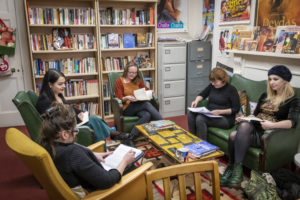

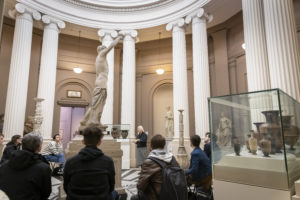

From arrival to alumni, we’re with you all the way:

Want to find out more about student life?
Chat with our student ambassadors and ask any questions you have.
A History degree from the University of Liverpool offers you the chance to develop skills such as teamwork, informed judgement, cultural awareness and leadership – skills which have been identified by the Association of Graduate Recruiters as those increasingly in demand with graduate employers.
Our graduates progress to a range of careers including banking, law, financial consultancy, national and local government, third sector work, journalism, publishing, teaching or work in heritage and culture organisations.
Recent employers include:
4 in 5 history students find their main activity after graduation meaningful.
(Graduate Outcomes, 2018-19.)
Hear what graduates say about their career progression and life after university.
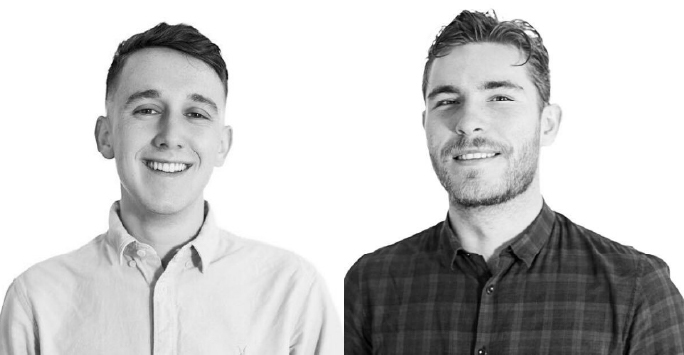
Gavin and Sam, History graduates from the University of Liverpool, were selected for the Santander Universities Emerging Entrepreneurs Programme to represent the University of Liverpool. In this short article, they discuss their business idea and their feelings about being nominated.

Can you tell us a little bit about your role at the House of Commons? “One of the best things about working in Parliament is that there really is no ‘typical day’. My role is to advise and work with the MP in responding to, and communicating, current affairs. On the Parliamentary side of things, […]
Your tuition fees, funding your studies, and other costs to consider.
Full-time place, per year - £9,535
Year abroad fee - £1,430 (applies to year in China)
Full-time place, per year - £24,100
Year abroad fee - £12,050 (applies to year in China)
The tuition fees shown are correct for 2025/26 entry. Please note that the year abroad fee also applies to the year in China.
Tuition fees cover the cost of your teaching and assessment, operating facilities such as libraries, IT equipment, and access to academic and personal support. Learn more about paying for your studies.
We understand that budgeting for your time at university is important, and we want to make sure you understand any course-related costs that are not covered by your tuition fee. This could include buying a laptop, books, or stationery.
Find out more about the additional study costs that may apply to this course.
We offer a range of scholarships and bursaries that could help pay your tuition and living expenses.
If you’re a high-achieving international student starting an undergraduate degree with us from September 2024, you could be eligible to receive a fee discount of up to £5,000. You’ll need to achieve grades equivalent to AAA in A levels. Most of our undergraduate degrees are eligible, with the exception of clinical programmes in Medicine and Dental Surgery.
Completed a Kaplan Digital Pathways Foundation Certificate? We’re offering a £5,000 fee discount off the first year of undergraduate study for a maximum of two high achieving students joining one of our non-clinical degrees from an online Kaplan Foundation Certificate.
Apply to receive tailored training support to enhance your sporting performance. Our athlete support package includes a range of benefits, from bespoke strength and conditioning training to physiotherapy sessions and one-to-one nutritional advice.
Completed a Foundation Certificate at University of Liverpool International College (UoLIC)? We’re offering a £5,000 fee discount off the first year of undergraduate study to some of the highest achieving students joining one of our non-clinical degrees from UoLIC.
We’re offering a £1,000 fee discount for years 2 and 3 of undergraduate study to eligible students progressing from University of Liverpool International College. You’ll need to be studying a non-clinical subject and get an average of 70% or above in year 1 of your degree.
If you’re a University of Liverpool International College student awarded a Kaplan Impact Scholarship, we’ll also consider you for an Impact Progression Scholarship. If selected, you’ll receive a £3,000 fee discount off the first year of your undergraduate degree.
Use our handy chatbot for your Clearing enquiries.
Last updated 17 June 2025 / / Programme terms and conditions